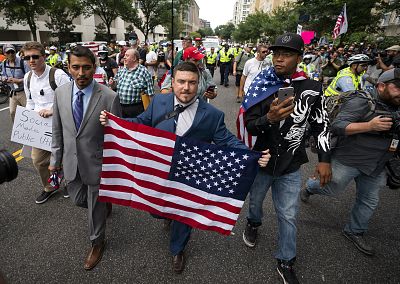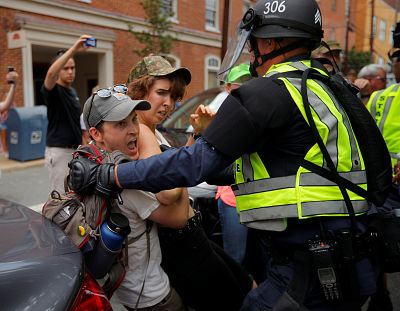As the second Unite the Right rally took place in Washington, those in Charlottesville remembered Heather Heyer who died last year.
WASHINGTON — Hundreds congregated in Lafayette Park, just steps away from the White House, on Sunday to protest the second Unite the Right rally, a gathering aimed to bring together multiple white nationalist organizations. In total, thousands more are expected turn out across the nation to protest the group's presence and purpose.
 ADVERTISEMENT
ADVERTISEMENT
 ADVERTISEMENT
ADVERTISEMENT
Jason Kessler, the white nationalist organizer of the Unite the Right rally, was accompanied by about a few dozen people when he arrived at the Vienna, Virginia, metro station at about 2 p.m. ET. There they boarded three orange line metro cars to the Foggy Bottom stop in Washington D.C.
Members of Kessler's group told journalists at the Virginia metro station that they were a "tool of the Zionist media." With their faces covered, the Unite the Right rally attendees also shared that they were the "founding stock" of the United States and claimed they were more American than non-whites.
When Kessler's group finally arrived at 3:30 p.m., he and the less than 20 people who remained were greeted by counter protesters shouting "Nazis, go home" and "you are not welcome here!"
A few rally-goers waved at the counter-protesters nonchalantly, earning jeers from the much larger crowd.
The police held a line between the white nationalists and the counter-protesters, who were separated by fences and about 50 feet of grass.
"We have people coming to our city for the sole purpose of spewing hate," Washington D.C. Mayor Muriel Bowser repeated said in a statement Sunday. "It didn't make sense last year, and it doesn't make sense now."
A year ago, white nationalists and anti-fascist counter protesters clashed in Charlottesville, Virginia, during the first Unite the Right event — or "white civil rights rally" — that Kessler organized. Heather Heyer, 32, a civil rights activist, was killed when James Alex Fields Jr. plowed through a crowd of counter-protesters on August 12 of last year.
When an emcee told the counter-protesters in Washington D.C. that Kessler had boarded a train from Virginia and was on his way to Washington, many began to boo.
Meanwhile, dozens with the racial activist group Black Youth Project 100 marched on H Street shouting, "Fight back, rise up!" as police blocked off the road to traffic.
But those at the counter-demonstration in Lafayette Park said they were pleased to see the protests so far were peaceful — and hoped they'd remain that way.
"I don't want to see any violence. This is my city," said Washington resident Alby Gyimah-Boadi, 32. "I'm here because I simply want to stand up for my rights and who I am. [White nationalists] have always had them, so for them to act as if they're rights are under attack now, it's wrong."
Meanwhile, in Charlottesville, dozens of people gathered to pay respects to Heyer and carry out a memorial on the street where she died — which also now bears her name. People laid flowers and signs that said "LOVE" and Heyer's street was covered in chalk drawings and phrases of support.
Early in the afternoon, Heyer's mother, Susan Bro, appeared to commemorate her daughter's memory. She laid flowers for her daughter, as well as the two police officers who died in a helicopter crash nearby on the same day.
Bro, without shoes on, hugged demonstrators in the streets and spoke to the crowd, thanking both the activists and the police for their presence. She spoke only briefly, but said the racial disparities in Charlottesville were vast and told the crowd that "we have got to fix this, or we'll be back right here in no time."
The crowd sang and Bro hugged other community members before departing.
Shortly after Bro exited, at least one of the demonstrators was pulled behind the police barricade, which elicited a strong response from the crowd that appeared to show a brewing resentment against the local police. Protesters chanted at the police to "Let them go" and later began a call and response of "Whose streets? Our streets."
"I saw the police last year watch Nazis drag people out of the crowd and beat them bloody, and they did nothing," said Kali Chicon, 32, a Charlottesville resident. "And now they've shown up and they're arresting people for standing in the street where someone died because of their incompetence."
Video from the 2017 rally showed officers stand and watch as people were beaten, and a scathing independent report released in December found multiple failures by Charlottesville city officials and police.
National guardsmen, armored cars and additional police soon arrived on the scene as billowing gray clouds began drizzling lightly on the crowd. Thunderstorms were expected in the region, but people stuck around Heyer's memorial and continued to discuss the importance of the moment.
A Charlottesville resident and Black Lives Matter activist at the memorial, Rosie Barker, 46, said she was 2 feet from Heyer when the young woman was hit by Field's car, and she described it as something that plays "over and over in my head."
"I came here today for a healing, for a cleansing," she said. "You're not going to be relieved through grieving or other mourning, but you have to put it in perspective that there is still a fight and you have to continue that fight."
Daniella Silva reported from Charlottesville, Virginia. Erik Ortiz reported from Washington, and Phil McCausland reported from New York.












